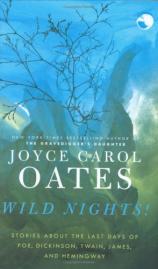Wild Nights!: Stories About the Last Days of Poe, Dickinson, Twain, James, and Hemingway
Review
Wild Nights!: Stories About the Last Days of Poe, Dickinson, Twain, James, and Hemingway
It’s doubtful that any writer other than Joyce Carol
Oates would dare tackle the task she’s set for herself in
this, her 21st short story collection. Not only has she vividly
imagined the last days of a handful of American literary icons, she
has done so while channeling the voices of those writers in these
five haunting tales. WILD NIGHTS! is a stylish and original piece
of literary craftsmanship that works both as a collection of
effective stories and as a literary treat for those of a more
scholarly bent.
Oates leads off the collection with “Poe Posthumous; or, the
Light-House,” a story suggested by a single-page manuscript
entitled “The Light-House” that was found among Edgar
Allan Poe’s papers after his death. The Poe of this story has
agreed to spend six months without human companionship tending the
lighthouse at Viña de Mar, off the Chilean coast, as part of a
scientific experiment on "aloneness." Accompanied only by his dog
Mercury, Poe confesses early in the story that he is “one of
those individuals of a somewhat fantastical & nervous
disposition, who entertains worries where there are none…yet
who does not sufficiently worry of what is.” The
laconic, fairly mundane diary entries that open the story
deteriorate when Mercury meets a tragic end, and soon reveal a mind
that’s beginning to crumble. When Poe imagines he’s
sharing the island with a herd of mutant creatures, his descent
into madness is complete. It’s a story as chilling as any Poe
horror tale.
“EDickinsonRepliluxe” is the only one of the pieces
that is not set in the author-subject’s times. Middle-aged
suburbanites Madelyn and Harold Krim have purchased a
“Repliluxe” of Emily Dickinson, a “brilliantly
rendered manikin empowered by a computer program that is the
distillation of the original individual.” Soon after
“Emily” arrives at the Krims’ home, she takes on
the duties of their servant, while writing on little pieces of
paper she stuffs into her apron pocket. Madelyn begins to write
poetry of her own, afflicted with what her husband derisively calls
the “scribbling disease.” As the bond between Madelyn
and Emily grows stronger, Harold’s disdain for the creature
culminates in a startling and violent climax to the story.
Mark Twain receives some rough treatment at Oates’s hands in
“Grandpa Clemens & Angelfish 1906.” He is revealed
as a 70-year-old curmudgeon, the line between whose literary and
real identities has blurred, with an unnatural fondness for
adolescent girls he calls his “Angelfish.” Twain
encounters a young girl named Madelyn Avery at one of his
performances and commences a correspondence with her that becomes
increasingly affectionate and inappropriate, ultimately leading to
meetings at a “secret place” in New York’s
Central Park. But when he discovers that the object of his
affection is 16 years old, two years older than he had imagined, he
cuts her off with a cruelty that has tragic consequences.
The most touching story in the collection is “The Master at
St. Bartholomew’s Hospital 1914-1916.” In it, an ailing
Henry James, “The Master,” volunteers at a London
hospital to care for British soldiers wounded in World War I. When
the sadistic Nurse Supervisor Edwards discovers that James has
become attracted to a Lieutenant Scudder who has been severely
wounded in a grenade attack, losing his leg among his other
injuries, she subjects the author to a gruesome penance before he
is permitted to return to Ward Six, where Scudder is hospitalized.
The story’s ambiguous closing pages, when the dying James and
the young soldier embark together on an ocean cruise, are both
tender and moving.
“Papa at Ketchum 1961” brings the collection to a grim
close. Narrated in Hemingwayesque prose, it is a stark account of
the writer’s musings as he contemplates the suicide he
accomplished on July 2, 1961. The story reveals a physically
wrecked man suffering from a titanic case of writer’s block
--- “Mornings when work does not come are long
mornings” --- as his mind ranges agonizingly over his life
and literary career. The glimpses into “Papa’s”
psyche, sinking ever deeper into depression and paranoia, are
unromantic and disturbing.
Joyce Carol Oates has made an immense contribution to American
literature, and we can only hope that her “last days”
are far in the future. These five tales further demonstrate why she
is worthy of being regarded alongside some of our most admired
literary talents.
Reviewed by Harvey Freedenberg (mwn52@aol.com) on January 24, 2011
Wild Nights!: Stories About the Last Days of Poe, Dickinson, Twain, James, and Hemingway
- Publication Date: April 1, 2008
- Genres: Fiction, Short Stories
- Hardcover: 256 pages
- Publisher: Ecco
- ISBN-10: 0061434795
- ISBN-13: 9780061434792





